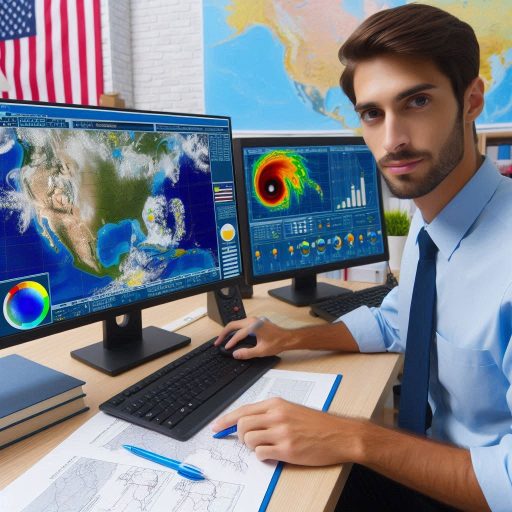Introduction
Climate change stands as one of the most pressing challenges of our time, profoundly affecting our environment and society.
As greenhouse gas emissions continue to rise, we are witnessing significant shifts in weather patterns and atmospheric conditions.
These changes manifest in the form of more frequent and intense storms, prolonged droughts, and extreme heatwaves, leading to severe consequences for ecosystems, economies, and communities worldwide.
As a result, the demand for skilled meteorologists is escalating, and their roles are becoming increasingly vital in our understanding and response to these climatic shifts.
Meteorologists are at the forefront of climate science, tasked with the critical job of interpreting complex data and providing accurate forecasts.
Their expertise enables them to analyze how climate change influences local and global weather systems.
This understanding is essential not only for predicting future weather events but also for advising governments, businesses, and the public on necessary preparedness measures.
As weather extremes become more unpredictable, meteorologists must evolve their approaches to ensure that they can offer reliable guidance.
Overview of Meteorology Careers
What Meteorology Is and the Various Career Paths Within the Field
Meteorology is the scientific study of the atmosphere and weather phenomena.
It involves understanding atmospheric conditions to predict weather patterns.
Meteorologists analyze data from satellites, weather stations, and radar systems.
They apply this information to develop forecasts that inform public safety and decision-making.
Various career paths exist within meteorology.
Some meteorologists work in government agencies, such as the National Weather Service (NWS).
They monitor weather conditions and issue warnings for severe weather events.
Others work in the private sector, providing forecasts for industries like agriculture and energy.
Research meteorologists focus on studying climate change and its impact on weather patterns.
They explore how changing temperatures affect precipitation and storm frequency.
Broadcast meteorologists present weather information to the public through television and online platforms.
They translate complex data into understandable forecasts for everyday viewers.
Operational meteorologists work in forecasting centers, producing short-term forecasts.
They analyze real-time data and communicate findings to emergency management teams.
Academic meteorologists teach at universities, training the next generation of meteorologists.
They also conduct research to advance knowledge in atmospheric sciences.
The Importance of Meteorologists in Studying and Predicting Weather Patterns
The role of meteorologists is crucial for public safety and preparedness.
They provide timely warnings about severe weather events, such as hurricanes and tornadoes.
This information helps individuals and communities take necessary precautions.
Accurate weather forecasts can minimize damage and save lives during natural disasters.
Meteorologists also play a significant role in studying climate change.
They examine long-term trends and patterns in weather data.
By understanding these changes, they can better predict future climate scenarios.
This knowledge is essential for governments and organizations developing strategies to mitigate climate impacts.
Moreover, meteorologists contribute to environmental protection efforts.
They provide data to help manage natural resources and assess environmental risks.
Their expertise supports initiatives aimed at reducing greenhouse gas emissions and promoting sustainability.
As climate change continues to influence weather patterns, the demand for meteorologists will likely increase.
New challenges will emerge, requiring advanced skills and knowledge.
Meteorologists will need to adapt to evolving technologies and methods in their field.
Meteorology offers diverse career opportunities that are vital for understanding our planet’s atmosphere.
Meteorologists play an essential role in studying and predicting weather patterns.
Their work impacts public safety, environmental management, and climate change research.
As the climate continues to change, the importance of meteorology will only grow.
The future of this field holds exciting prospects for those passionate about science and weather.
Impact of Climate Change on Weather Patterns
How Climate Change Is Altering Weather Patterns Globally
Climate change significantly alters weather patterns across the globe.
Rising global temperatures influence atmospheric circulation, leading to changes in precipitation and temperature distributions.
Warmer air can hold more moisture, resulting in increased rainfall in some regions and drought in others.
Consequently, these changes disrupt established weather norms and contribute to more volatile climate conditions.
The warming climate also affects seasonal patterns.
For instance, spring arrives earlier in many regions, while winter conditions become less severe.
These shifts disrupt ecosystems, agriculture, and water supply systems, complicating resource management.
In addition, the increased frequency of El Ni‘o and La Ni‘a events further influences global weather patterns, exacerbating climate variability.
Examples of Extreme Weather Events Linked to Climate Change
Extreme weather events are increasingly linked to climate change, with notable examples emerging worldwide.
Hurricanes have become more intense due to warmer ocean temperatures.
The 2017 hurricane season showcased this trend, with Hurricanes Harvey, Irma, and Maria causing unprecedented devastation in the Caribbean and the United States.
Droughts are another consequence of climate change.
Regions such as the American Southwest and parts of Africa experience prolonged dry spells.
These droughts threaten food security, water supplies, and ecosystems.
The 2019 drought in Australia severely impacted agriculture, leading to significant economic losses.
Heatwaves are also on the rise, with record-breaking temperatures becoming more common.
The European heatwave of 2019 brought extreme temperatures to many countries, resulting in health crises and increased mortality rates.
In the United States, cities like Phoenix and Las Vegas are facing more frequent and intense heatwaves, straining energy resources and public health systems.
Flooding is another serious concern linked to climate change.
Increased rainfall and rising sea levels contribute to more frequent flooding events.
For example, Hurricane Florence in 2018 caused catastrophic flooding in North Carolina, leading to massive property damage and displacement of communities.
Moreover, wildfires are becoming more frequent and intense due to hotter, drier conditions.
The 2020 wildfire season in California was one of the worst on record, with millions of acres burned and devastating air quality effects.
These wildfires not only threaten lives and property but also contribute to carbon emissions, further exacerbating climate change.
Climate change profoundly impacts global weather patterns.
It alters precipitation, temperature, and seasonal norms, leading to extreme weather events.
Hurricanes, droughts, heatwaves, flooding, and wildfires are just a few examples of the consequences of a warming climate.
Understanding these changes is essential for developing strategies to adapt and mitigate the effects of climate change on communities and ecosystems.
Read: How Climate Change Is Impacting Plant Research
Increased Demand for Meteorologists
How the Changing Climate Is Leading to a Greater Need for Skilled Meteorologists
The changing climate is driving a significant increase in the demand for skilled meteorologists.
As extreme weather events become more frequent and severe, society requires accurate and timely weather forecasts.
This growing need pushes meteorologists to refine their skills and expand their expertise in climate science.
Climate change has complicated weather patterns, making predictions more challenging.
Meteorologists must analyze vast amounts of data to provide accurate forecasts.
The increasing complexity of weather systems means that experts in meteorology are more vital than ever.
Governments, businesses, and communities all seek reliable forecasts to prepare for unpredictable weather.
The rise in natural disasters further emphasizes the need for qualified meteorologists.
Hurricanes, floods, droughts, and heatwaves create urgent demands for expert analysis.
Emergency management agencies rely on meteorologists to provide actionable insights during these crises.
As climate change continues to escalate, the demand for skilled professionals in this field is likely to increase.
The Significance of Having Experts Who Can Accurately Predict and Prepare for Extreme Weather Events
Having experts who can accurately predict and prepare for extreme weather events is essential for public safety and well-being.
Skilled meteorologists provide critical information that helps communities respond effectively to severe weather.
Their forecasts enable individuals and governments to take necessary precautions to minimize damage and save lives.
Accurate weather predictions also support emergency response efforts.
Meteorologists collaborate with first responders and local authorities to ensure timely evacuations and resource allocations.
This coordination is vital in mitigating the impacts of disasters, allowing communities to recover more quickly.
Moreover, meteorologists contribute to economic stability.
Many industries, such as agriculture, energy, and transportation, rely on accurate weather forecasts to make informed decisions.
For example, farmers depend on reliable predictions to optimize planting and harvesting schedules.
Businesses in the energy sector use forecasts to manage supply and demand during extreme temperatures.
In addition, meteorologists play a crucial role in public education.
They communicate risks and safety measures to the public during severe weather events.
By informing communities about potential hazards, meteorologists empower individuals to make safe choices during emergencies.
Furthermore, the significance of meteorologists extends beyond immediate weather events.
Their work informs long-term climate strategies and policies.
As experts analyze trends and data, they provide insights that guide governments in addressing climate change and implementing sustainable practices.
The changing climate has led to a heightened demand for skilled meteorologists.
Their expertise is vital for predicting and preparing for extreme weather events.
Accurate forecasts enhance public safety, support economic stability, and empower communities to respond effectively to natural disasters.
As climate challenges persist, the role of meteorologists will become increasingly important in safeguarding lives and enhancing resilience against the impacts of climate change.
Read: Exploring the Different Branches of Geology

Opportunities for Research and Innovation
The Potential for Meteorologists to Conduct Research on Climate Change and Its Effects
Meteorologists have significant opportunities to conduct research on climate change and its effects.
As the impacts of climate change become increasingly apparent, the need for in-depth analysis grows.
Researchers can study how rising temperatures, changing precipitation patterns, and extreme weather events affect various regions and ecosystems.
This research can improve understanding of climate dynamics and enhance weather forecasting models.
Collaboration among meteorologists, climatologists, and other scientists is crucial for advancing this research.
Interdisciplinary studies can provide comprehensive insights into the interactions between climate change and weather patterns.
For instance, studying how climate change influences hurricane intensity can lead to better prediction models.
Such research can also help policymakers develop effective strategies to mitigate the impacts of climate change.
Furthermore, meteorologists can explore the social and economic effects of climate change.
Researching how extreme weather events impact communities allows for the development of tailored responses.
This research can inform disaster preparedness initiatives and contribute to building resilient infrastructure.
By understanding the vulnerabilities of different regions, meteorologists can play a vital role in guiding adaptation strategies.
The Importance of Developing New Technologies and Methods for Studying and Predicting Weather Patterns
The development of new technologies and methods is essential for studying and predicting weather patterns.
Advances in technology can significantly enhance meteorological research and forecasting capabilities.
For instance, satellite technology provides real-time data on atmospheric conditions, enabling more accurate predictions.
Improved radar systems can offer detailed insights into precipitation and storm development.
Moreover, innovative modeling techniques can simulate complex weather patterns more effectively.
These models help meteorologists predict future climate scenarios and assess potential impacts.
By integrating machine learning and artificial intelligence, meteorologists can analyze vast datasets and uncover patterns that were previously unnoticed.
This technological evolution allows for improved accuracy in weather predictions.
The importance of developing new tools extends to public engagement and education as well.
User-friendly apps and online platforms can provide real-time weather updates and alerts to communities.
Enhanced communication tools help meteorologists share vital information with the public during severe weather events.
By making forecasts accessible, meteorologists empower individuals to make informed decisions for their safety.
Additionally, collaborative research initiatives can drive innovation in meteorology.
Partnerships between universities, government agencies, and private companies can lead to groundbreaking discoveries.
For example, research into renewable energy sources and their weather dependencies can inform energy management strategies.
Meteorologists have significant opportunities for research and innovation in the context of climate change.
Their work can deepen understanding of climate dynamics and enhance weather forecasting capabilities.
Developing new technologies and methods is essential for improving predictions and informing public safety.
As meteorologists embrace these opportunities, they will play a critical role in addressing the challenges posed by climate change and fostering a more resilient future.
Read: Top Skills Needed for a Successful Geology Career
Challenges Faced by Meteorologists
The Challenges That Meteorologists May Face in Adapting to Climate Change
Meteorologists encounter several challenges as they adapt to the realities of climate change.
One major issue is the increasing complexity of weather systems.
Climate change alters traditional weather patterns, making predictions more difficult.
Meteorologists must continually update their knowledge and techniques to keep pace with these changes.
Another challenge is the need for advanced data collection and analysis tools.
As weather phenomena become more complex, meteorologists require more accurate and comprehensive data.
This necessitates investments in technology and training.
Many meteorological organizations face budget constraints, limiting their ability to acquire the latest tools and technologies.
Additionally, climate change research often relies on interdisciplinary collaboration.
Meteorologists must work alongside climatologists, oceanographers, and other scientists to understand the full impact of climate change.
However, fostering effective collaboration can be challenging due to differences in methodologies and priorities among disciplines.
Moreover, public communication poses a significant challenge for meteorologists.
As weather patterns become less predictable, it becomes essential to convey uncertainty to the public.
However, communicating complex scientific information in an understandable way can be difficult.
Meteorologists must balance the need for accurate information with the potential for public panic or misinformation.
The Obstacles in Accurately Predicting Increasingly Unpredictable Weather Events
Accurately predicting increasingly unpredictable weather events presents significant obstacles for meteorologists.
One major issue is the growing frequency and intensity of extreme weather events.
As climate change progresses, events such as hurricanes, heatwaves, and heavy rainfall become more severe and less predictable.
This unpredictability makes it challenging for meteorologists to develop accurate forecasts.
Another obstacle is the limitations of current forecasting models.
While meteorological models have advanced, they still struggle to capture the complexities of rapidly changing weather systems.
For example, localized events like flash floods can occur with little warning, as existing models may not account for sudden shifts in atmospheric conditions.
This limitation can lead to insufficient warnings and preparation time for affected communities.
Additionally, the influence of natural climate variability complicates predictions.
Events like El Ni‘o and La Ni‘a can significantly impact global weather patterns.
These fluctuations introduce uncertainty into forecasting efforts, making it difficult to pinpoint specific outcomes.
Meteorologists must consider both human-induced climate change and natural variability in their predictions.
Moreover, the integration of vast amounts of data from various sources presents a challenge.
Meteorologists rely on data from satellites, ground stations, and buoys to inform their forecasts.
However, synthesizing this data into coherent predictions can be complex.
Inconsistent data quality and coverage can lead to inaccuracies in forecasting.
Finally, the growing public expectation for immediate and accurate weather information adds pressure on meteorologists.
As technology improves, society increasingly demands real-time updates.
However, the inherent unpredictability of weather events can result in frustrations when forecasts do not meet these expectations.
Meteorologists must manage public perceptions while striving to provide the most accurate information possible.
Meteorologists face numerous challenges in adapting to climate change and accurately predicting increasingly unpredictable weather events.
The complexity of weather systems, limitations of forecasting models, and the need for effective public communication all present significant obstacles.
Addressing these challenges will require ongoing research, collaboration, and innovation within the field of meteorology.
Read: The Future of Botany: Emerging Fields and Innovations
Importance of Climate Change Education for Meteorologists
The Importance of Including Climate Change Education in Meteorology Programs
Incorporating climate change education into meteorology programs is essential for preparing future meteorologists.
As climate change continues to reshape global weather patterns, understanding its implications becomes crucial.
Meteorologists must be equipped with the knowledge to analyze and interpret the effects of climate change on weather systems.
Climate change education can help meteorologists recognize the long-term trends that influence short-term weather events.
By understanding these relationships, meteorologists can improve their forecasting skills and provide more accurate information to the public.
This knowledge also empowers them to contribute to climate resilience strategies, helping communities adapt to changing conditions.
Moreover, as public awareness of climate change grows, meteorologists face increasing scrutiny regarding their forecasts.
Having a strong foundation in climate science allows meteorologists to communicate effectively about the potential impacts of climate change.
This education can foster public trust and enable meteorologists to engage in meaningful discussions about climate-related issues.
Furthermore, incorporating climate change education fosters interdisciplinary collaboration.
Meteorology programs that emphasize climate science can encourage partnerships with environmental scientists, policymakers, and community leaders.
These collaborations can lead to innovative solutions for addressing climate-related challenges.
How Having a Strong Understanding of Climate Science Can Enhance Meteorologists’ Abilities to Predict Weather Accurately
A strong understanding of climate science significantly enhances meteorologists’ abilities to predict weather accurately.
By studying climate dynamics, meteorologists can grasp the underlying mechanisms driving weather patterns.
This knowledge allows them to recognize how climate change influences phenomena like hurricanes, droughts, and heatwaves.
For instance, understanding the relationship between ocean temperatures and storm intensity can improve hurricane forecasts.
Meteorologists can better assess potential risks and provide timely warnings when they have a solid grasp of these connections.
This understanding is critical for effective emergency management and public safety.
Additionally, knowledge of climate variability helps meteorologists interpret current weather events in a broader context.
By considering long-term climate trends, meteorologists can identify patterns that may indicate shifts in weather behavior.
This insight enables them to make more informed predictions about future weather conditions.
Furthermore, a strong foundation in climate science allows meteorologists to assess uncertainty in their forecasts.
Climate change introduces additional variables that can affect weather patterns.
Meteorologists who understand these complexities can communicate uncertainty to the public more effectively.
This transparency is essential for building trust and helping communities prepare for unpredictable weather.
Moreover, meteorologists with a background in climate science can contribute to developing more accurate forecasting models.
They can integrate climate data into existing models, enhancing their predictive capabilities.
This continuous improvement is vital as weather patterns become more erratic due to climate change.
In essence, climate change education is essential for meteorology programs.
It equips future meteorologists with the knowledge and skills needed to navigate the challenges posed by a changing climate.
A strong understanding of climate science enhances meteorologists’ forecasting abilities, improves public communication, and fosters interdisciplinary collaboration.
As the impacts of climate change intensify, investing in climate education for meteorologists will be crucial for ensuring accurate and reliable weather predictions.
Collaboration with Climate Scientists
The Benefits of Meteorologists Working Closely with Climate Scientists to Study Climate Change
Collaboration between meteorologists and climate scientists offers numerous benefits in understanding climate change.
By working together, these professionals can integrate their expertise to provide a comprehensive view of weather and climate systems.
Meteorologists focus on short-term weather events, while climate scientists study long-term trends.
Their collaboration fosters a more holistic understanding of how climate change influences weather patterns.
One significant benefit is improved accuracy in weather forecasting.
Climate scientists contribute valuable insights into how climate change impacts weather variability and extremes.
Meteorologists can incorporate this information into their forecasting models, leading to more reliable predictions.
This collaboration enhances the ability to anticipate severe weather events, ultimately benefiting public safety and preparedness.
Additionally, working closely with climate scientists allows meteorologists to stay updated on the latest research and advancements in climate science.
This exchange of knowledge helps meteorologists refine their methodologies and adopt innovative practices.
As climate science evolves, meteorologists can ensure their approaches remain relevant and effective.
Collaboration also facilitates the development of targeted adaptation strategies.
By understanding the specific effects of climate change on regional weather patterns, meteorologists can provide critical information to policymakers and communities.
This information can guide decision-making processes, helping society adapt to the challenges posed by a changing climate.
The Potential for Interdisciplinary Research and Collaboration in Addressing the Impact of Climate Change on Meteorology Careers
Interdisciplinary research and collaboration have significant potential for addressing the impact of climate change on meteorology careers.
Engaging with experts from various fields, such as oceanography, ecology, and urban planning, can lead to innovative solutions for climate-related challenges.
For example, collaborating with ecologists can help meteorologists understand how changing weather patterns affect ecosystems and biodiversity.
Moreover, interdisciplinary teams can tackle complex issues that require diverse perspectives.
Addressing the impacts of climate change on agriculture, water resources, and public health necessitates collaboration among specialists in different domains.
Meteorologists, working alongside experts in these fields, can contribute valuable insights about weather patterns and their implications.
Additionally, interdisciplinary research can enhance educational opportunities for meteorologists.
By collaborating with climate scientists and other experts, meteorology programs can offer students a well-rounded curriculum.
This approach can prepare graduates for a job market that increasingly values interdisciplinary skills and knowledge.
Uncover the Details: Daily Life of a Space Scientist: A Typical Workday
Transform Your Career Today
Unlock a personalized career strategy that drives real results. Get tailored advice and a roadmap designed just for you.
Start NowConclusion
The impact of climate change on meteorology careers is significant and cannot be ignored.
The changing climate patterns are affecting the way meteorologists predict weather, leading to greater challenges in forecasting.
It is crucial for meteorologists to adapt to these changes by utilizing advanced technologies and analytical methods to improve accuracy in weather predictions.
Additionally, there is a need for more research and collaboration in the field to understand the complex relationship between climate change and meteorology.
Considering climate change in the context of meteorology careers is essential for the sustainability of the profession and the safety of communities.
Proactive measures, such as implementing sustainable practices and advocating for policies that address climate change, are necessary to mitigate its impact on meteorology careers.
Ultimately, meteorologists play a crucial role in understanding and communicating the effects of climate change on weather patterns.
By staying informed, proactive, and innovative, meteorology professionals can contribute to a more resilient and sustainable future in the face of climate change.
[E-Books for Sale]
The Big Book of 500 High-Paying Jobs in America: Unlock Your Earning Potential
$19.99 • 500 High-Paying Jobs • 330 pages
Explore 500 high-paying jobs in America and learn how to boost your career, earn more, and achieve success!
See All 500 High-Paying Jobs of this E-Book
1001 Professions Without a Degree: High-Paying American Jobs You Can Start Now
$19.99 • 1001 Professions Without a Degree • 174 pages
Discover 1001 high-paying jobs without a degree! Unlock career tips, skills, and success strategies for just $19.99!




